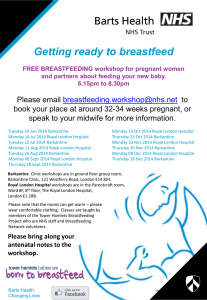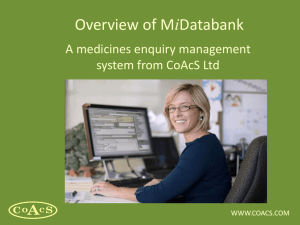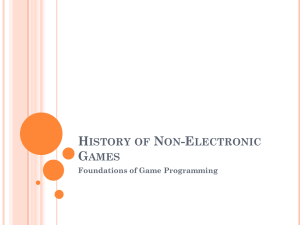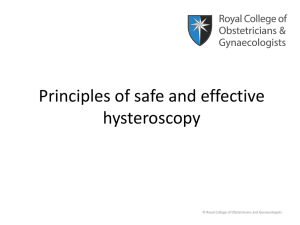Dr Marisa Mason (NCEPOD)
advertisement
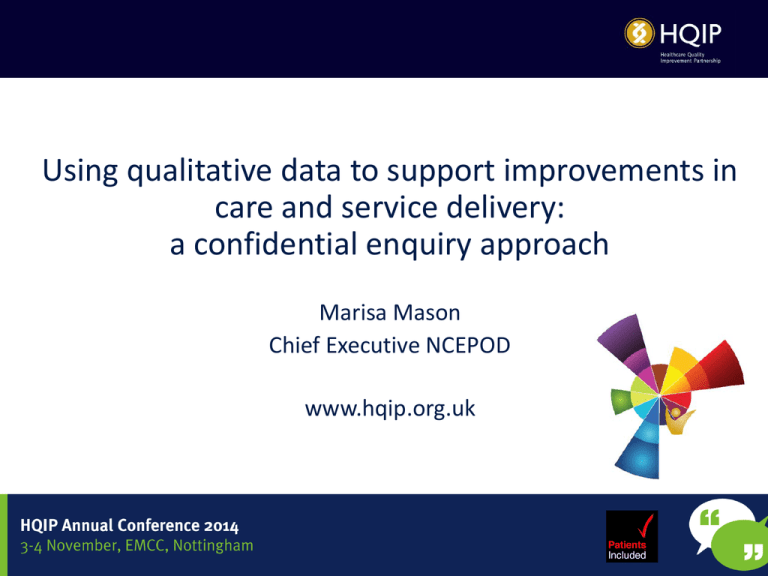
Using qualitative data to support improvements in care and service delivery: a confidential enquiry approach Marisa Mason Chief Executive NCEPOD www.hqip.org.uk What is a confidential enquiry • History of the Enquiries • What NCEPOD is/does • National improvement • Local improvements Enquiry history • • • • • • • CESDI/CEMD - CEMACH - CMACE MBRRACE-UK CHILD HEALTH-UK NCISH CIPOLD NRAD CEPOD – NCEPOD • • • • DH NICE NPSA HQIP 1982 • Mortality Associated with Anaesthesia • Lunn and Mushin 1982 • The Nuffield Provincial Hospitals Trust 1987 CEPOD • The Report of a Confidential Enquiry into Peri-operative Deaths. • Buck, Devlin & Lunn 1987 The Nuffield Provincial Hospitals Trust • Emphasis on Quality of Care Not Causation What we do • We review medical, surgical and anaesthetic practice • We make recommendations to improve the quality of the care delivered • Use qualitative methods Types of qualitative data methods • Literature reviews • Story telling • Consensus exercises – Delphi etc • Interviews • Focus groups • On-line surveys • Observations • Questionnaires • Case study – note review How we do it How we do it • Call for topics • Topics chosen by the professions/funding bodies • Study Advisory Group • Multidisciplinary and includes lay representatives • Define protocol, questionnaires and assessment form • Retrospective/prospective • Questionnaire completion • Photocopied extracts of the case notes How we do it • Case note review meetings • Peer review – multidisciplinary coal-face health care professionals • Organisational data • Qualitative and quantitative analysis • Simple report – no statistics • Case studies are used to example good and poor care – ‘crimewatch reconstruction’ How we do it • Case note review meetings • Peer review – multidisciplinary coal-face health care professionals • Organisational data • Qualitative and quantitative analysis • Simple report – no statistics • Case studies are used to example good and poor care – ‘crimewatch reconstruction’ Example case study An elderly patient complained to their GP of a severe headache for 24 hours that had not responded to analgesia. Severe spasm and pain in the neck muscles were noted by the GP. The patient also complained that light was upsetting but this was not considered to be “true” photophobia. The next day the patient telephoned the surgery as they were no better, after attending surgery that evening the patient was referred to the local hospital where their management was exemplary and the aneurysm successfully treated. Despite classical symptoms and signs of a SAH the patient was not admitted to hospital for 36 hours and calling for guidelines on the management of severe headache to be circulated widely in primary care. Example case study A 52 year old patient had a series of 22 alcohol-related admissions over a two year period. The documentation on each occasion made detailed assessment of the patient’s alcohol intake including the risk of withdrawal. Assessment tools were used. There was good documentation of continued offers of support and referral to support services presented in a language that was easy to understand. The Advisors’ view was that this was an example of good practice. The notes reflected teams who maintained good standards of care and tried very hard on behalf of the patient who despite this continued to drink. Example case study Following investigation with a barium enema and endoscopy, a carcinoma of the colon with complete obstruction was diagnosed. Two weeks later the patient was admitted with lower abdominal pain and constipation. The previous notes and X-rays were not available nor was the patient clear about their condition. The surgical team caring for the patient on this occasion was therefore unaware of the diagnosis and no operation was performed. A few days later the patient perforated their bowel and was taken to the operating theatre but the clinicians had still not seen the original notes or X-rays. Examples of poor culture “Our coroner does not permit communication between his pathologist and the surgeon unless the surgeon has a specific question” “The consultant surgeon has a particularly arrogant personality and creates a tense and unpleasant atmosphere in theatre” “I was not happy that the locum surgeon was good enough” “The patient is still drinking so I will not accept them to my ICU” Why the approach works • Confidential • Simplicity of the method and easy to read reports • Peer review – not ivory tower • Independent in views • Put into a report what people already suspect… …reactions to the findings are assessed before publishing NCEPOD supporting bodies • Faculty of Public Health Medicine of RCP of UK • Association of Anaesthetists • Association of Surgeons • Royal College of Anaesthetists • Royal College of Radiologists • Royal College of Ophthalmologists • Royal College of Surgeons • Lay Representatives • IAG • Funders • Academy of Medical Royal Colleges • Faculty of Dental Surgery of RCS • Royal College of Pathologists • Royal College of Obstetricians & Gynaecologists • Royal College of Physicians • Royal College of General Practitioners • Royal College of Nursing • Royal College of Child Health and Paediatrics • College of Emergency Medicine Structure • 550+ Local reporters • 100+ Ambassadors • 10,000 hrs/yr Clinicians providing input Participation • NHS Quality Accounts/NCAPOP • Continued professional development – certificates • Required under Good Medical/Surgical Practice Reports National improvements Trauma: Who cares? Emergency Admissions: A journey in the right direction? A report of the National Confidential Enquiry into Patient Outcome and Death (2007) A report of the National Confidential Enquiry into Patient Outcome and Death (2007) Trauma • Trauma: Who cares? • 48% of patients received less than good care in the view of the advisors • Consultant involvement low • Delays in treatment • Avoidable deaths • Patients received better care in centres that reported a high volume of cases Trauma • Trauma: Who cares? • Widely accepted report by the professions • Timely in view of Ara Darzi’s reform of services • Appointment of a new National Director for Trauma care Acutely Ill Patients • 1500 patients • Lack of consultant involvement • Lack of recognition of illness • Poor monitoring • Poor supervision • Lack of knowledge • Failure to seek help / working outside competence Acutely Ill Patients Acute kidney injury • 1500 patients • Only 50% of AKI care was considered good • There was poor assessment of risk factors for AKI • 20% of post-admission AKI was both predictable and avoidable • Only 12% of patients received RRT • Treatment limitations were made in 52% of patients Acute kidney injury Cosmetic surgery “You may be aware that Sir Bruce Keogh is currently leading a review of the regulation of cosmetic interventions in England, which was requested by the former Secretary of State for Health, Andrew Lansley, following the events surrounding PIP breast implants. We believe that the NCEPOD report, On the face of it, is a key document for the Committee's consideration, given its clear evidence-base and incisive recommendations.” Local improvements Are We There Yet? "We had a complete review of all children’s services, updated training schedules and developed a change of paediatric cover available (medical) at the hospital." Measuring the Units "Because of this report I was able to recruit an alcohol liaison nurse, the funding for which I lost some years ago and have been trying to get back." Time to Intervene "This NCEPOD report has had a clear impact on the provision of resuscitation at out hospital. Specifically, the recommendation on page 68 that "The use of ‘ceilings of care’ documentation would facilitate decision-making and clarity of intent." Partly in response to this recommendation, the Hospital introduced a combined DNACPR/Ceiling of Treatment (CoT) form in July 2012. We have seen a significant improvement in the completion of these forms. Our cardiac arrest rate has decreased from 1.57 per 1000 admissions in 2011-2012 to 1.29 per 1000 admissions in 2012-13 (P=0.20) - although not statistically significant as yet I am expecting this cardiac arrest rate to continue to fall as a result of the CoT form." Checklists Audit tools Benchmarking data Qualitative data “Does the manager of a department store need to carry out a case control study to establish that staff should be friendly, alert, supportive, well turned out and punctual?“ Group work At your table Share one instance locally where qualitative work (not necessarily an enquiry) has led to an improvement in patient care www.ncepod.org.uk
